Can the GAPS (Gut and Psychology Syndrome) Diet help those with Autism?
And can it help people with other mental, digestive, allergy or autoimmune issues?
According to the CDC, in 2014, the incidence of ASD (Autism Spectrum Disorder) in the USA was 1 in 68. Back in the 70s and 80s, this was more like 1 in 2000.
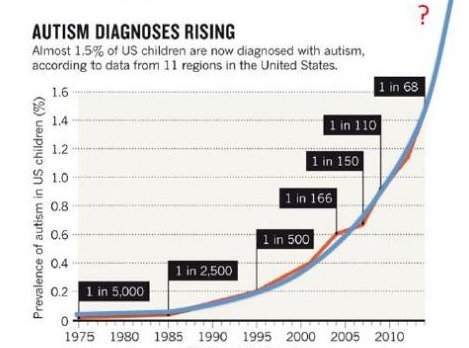
There are many reasons why this could be and I’ll mention some of those below. But first a philosophical view of autism.
Yesterday I read a poem by @positivesteem about his son’s autism and how that has affected him. Nobody is denying that being autistic or parenting an autistic child presents many challenges, but equally I don’t often see people talking about the potential rewards. Who better to talk about this than @positivesteem?
What I do see is (mainly high-functioning) ASD people saying they do not want to be “neuro-typical”, and that the ability to think and see things in a different way brings a lot of richness to their lives. Maybe our society needs this richness and diversity to be able to progress to a new level. Because we have to admit that neuro-typicals haven’t exactly made a success of running the show.
Neuro-typical is shorthand for neurologically typical, and is often used by ASD people to describe the so-called “normal” population. Dare I suggest that here on Steemit, a lot of us are at least partway on the atypical spectrum? That wasn’t an insult, by the way.
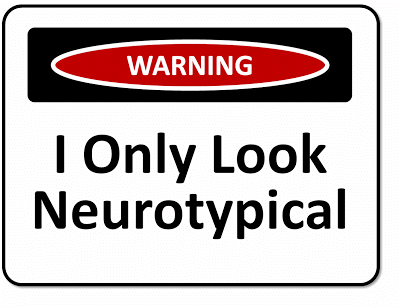
So we could say that ASD can’t be “cured”, and that’s ok, we don’t want to cure it. But there are interventions that can help people become more comfortable in their own bodies, more comfortable in the world as it currently is, and better able to function at their highest potential. In fact, isn’t that what we all want?
There are many possible interventions, but today I want to talk about a specific therapeutic nutritional regime.

Introducing Dr Natasha Campbell-McBride. She is a Russian neurologist and neuro surgeon who now lives and works in England. One of her sons was born with autism, and she put her knowledge of neurology and nutrition to work on the issue, and came up with the Gut and Psychology Syndrome protocol. She used it with her son, and has been using it with many other children over the last 20 years, with a high degree of success.
Since then, she has published her book, and trained other practitioners, and now many other doctors and nutritional therapists have successfully used it.
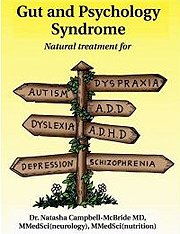
The central premise of GAPS is that the underlying problem with autism, and a wide range of other physical and mental issues, is a poorly functioning gut. This starts with a bad balance of gut bacteria, and can eventually include a damaged gut wall.
In her book, she talks about many of the potential causes, including:
• Poor nutrition
• Too much sugar, high carbs
• Not eating fermented foods
• Prescription drugs such as antibiotics, painkillers and the contraceptive
• Vaccinations
• Heavy metals
• Chemical toxicity
• Stress, and
• Unbalanced gut flora being passed down from mother to baby
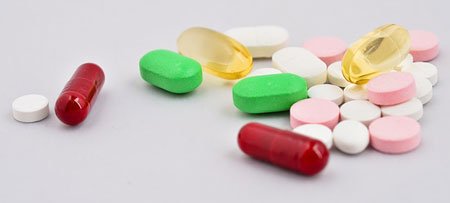
The protocol aims to:
• Repair the gut lining
• Rebalance the gut flora
• Gently detoxify
This is done mainly with diet and lifestyle, and with certain specific supplements.
It takes things a step further than just a gluten and casein (dairy) free diet, which helps some people but not all, and temporarily cuts out some other foods that are hard to digest.
Note the “temporarily”. GAPs is a healthy diet in itself, and can be followed for years without nutritional deficiencies. But we are aiming to repair the gut, so that other foods can be reintroduced, making social occasions a lot easier!
Depending on how ill we are, and how long we have been ill, GAPS may not be able to cure the physical components completely. But in the vast majority of cases, following the protocol for a period of time results in at least some improvement. For children, she has often observed complete remission of symptoms.
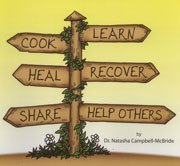
More than 2000 years ago, Hippocrates said “all disease begins in the gut”. If that is true, using GAPS, or other gut repair protocols, can potentially heal many other diseases as well. If you have mental or psychological issues, food sensitivities, digestive issues or autoimmunity, consider learning more about GAPS.
That’s all we’ve got time for today, folks, but I’ll post some more about the particulars of the GAPS protocol tomorrow.
Part 2 - GAPS Unfriendly foods, and why
Part 3 - GAPS Friendly foods
Thanks for reading and upvoting! Follow me for more nutrition, health, diet, food, lifestyle and recipe posts.

Thank you @kiwideb for this article. As I mentioned before, my son Jonathan is still now the gluten and casein free diet. His hyperactivity reduce ever since he was on this diet. @anarchyhasnogods , I wish that more people would write about autism. We can write ab out it from different perspective.
Do you think more people don't talk / write about it, as it's considered by many to be a stigma? With more open discussion taking place, maybe it would start to be seen as a different way of being, but not necessarily worse.
I will probably do two more posts. The next one (hopefully later today) explaining the foods that are excluded and why. Then the next on the foods to eat and why.
Yes, it is sad that autism is still considered as a stigma. That's wahy more awareness on autism is required. It is not easy to talk or write openly about having a disabled child.
I can talk about it better than him because I have it.
Good point. He's a good person to talk from the point of view of a parent. But you'd be better from an inside perspective.
Thank-you @kiwideb for helping people get healthy.
Thanks. And thanks also for you and your husband's work opening people's eyes on vaccination. In GAPS children, some people think that vaccination is the cause. Dr Natasha thinks (and I think she's probably right) that vaccination is the trigger (but not the only cause) in a vulnerable child that already has risk factors. But children with strong guts can cope better. Either way, why take the risk!
My sister showed me this thing about a month ago, I haven't followed up with her to see how she's going (and I keep bugging her to join Steem, she has a trailerload of great artwork she could post, and poetry). But it was funny to hear the basic premise of it... nearly, and more or less, a low or zero carb diet. She has rheumatoid arthritis. I hope it's helping, because she is crippled by it. She spent some years addicted to oxycodone because of the pain.
I have been following it mostly, except I have potato fairly regularly, and it's certainly helping my mind function. Oh yeah, and I keep drinking these damned energy drinks .>_<. And beer... Well, it's not as bad anyway, malts are not as bad as high glucose starches or dual-ring sugars. But I'm sure once that I get fully on the diet, when I have a bit more money happening for a broader variety...
I actually went full ketogenic diet for a little while. I think it helped, too. I didn't lose any weight, and I was not feeling hungry most of the day. I was consuming quite a lot of pig fat. I am now mostly with butter, but I really wish I could find bovine fat, it tastes quite a bit better. Fat is a far better source of energy than carbs.
As I said above, I'll probably do two more posts. The next one (hopefully later today) explaining the foods that are excluded and why. Then the next on the foods to eat and why.
For your sister, is she cutting out all nightshades as well? Although only potato is excluded from GAPS, I recommend cutting out nightshades as well (at least as a trial) for rheumatoid arthritis.
It can be done as low / zero carb, and for those that suit that way of eating it works well. But it doesn't have to be. It is specific carbs that are excluded, but others reading your comment won't understand yet what you know - that the simple sugars can be digested, so ripe fruit and honey are allowed. Plus certain root veges.
Thanks for commenting.
My sister explained all this to me, yes, it's not a ketogenic diet, it's specific types of carbs. I haven't heard from her in a while, she is in the midst of the ending of a relationship and her life is probably quite topsy-turvy at the moment. She has been a student of nutrition for a long time, she may already know about solanacaea.
I did a stint in prison and the diet was completely wrong for me, and caused me to get the worst bronchoconstriction I have ever experienced in my life. With all the time in the world available to do testing, I elimination tested every bit of food I was given, and I discovered that the only food on the menu that did not make the allergy happen was meat and apples. Alliums, Solanacae, Melon fruits, Wheat, Dairy.
I thought we might be starting to nest too deep, so replied to an old post of yours. I ate all animal foods for a year, but needed to come off it to give my adrenals a bit of a boost. I'm now sleeping much better with a few carbs, but would like to go back to mostly animal foods, maybe keto, and intermittent fasting too. I'd prob eat twice a day.
You can get heaps of animal fats by collecting it from your own roasts. If I do a duck, i get nearly a 500ml jar of fat.
Gosh, that's tough. The good news about that, though you wouldn't have known at the time, is that you can eat just meat for extended periods of time, and still meet all your nutritional needs. It's not easy to do psychologically, and I don't imagine there was enough available, though.
I forgot to say - as a result of what i learned, I petitioned to go see doctors and begged for a diet change. No dice. So the solution ended up being taking an antihistamine called 'chlorpyramine' which stopped the wheat allergy reaction in my lungs. It extended what I could eat but I still had to leave out almost everything else.
I did already know :) I didn't know about the GAPS theory before but I knew well enough about much of my allergy and neurological problems and diet, I hadn't heard of the ketogenic diet - and I want to ultimately switch to it fully, because I get a lot more energy out of fats than carbs anyway. For maybe a bit over a month I was on this diet and I ate once a day and never felt hungry. I still eat things like green peas and carrots, but that's about it for carbs. It can be difficult to find sources for fats in my local marketplace, but I'm pretty sure that I can buy buckets of dripping from somewhere for cheap. I've never tried sheep dripping, actually, that is probably readily available here. I would love to find a source for an unrefined animal fat.
Considering the rise in autism has been linked to mercury poisoning, I believe it follows logical sense that if you eat a diet consisting of plants that elimintae heave metals from your system, it would significantly help. Overall, diet is the largest factor in how our body functions. Great article!
Part of the GAPS diet is vegetable juicing to gently detox. But it's not exclusively plant based, as many plants are too hard to digest when the gut isn't working. More on that soon! I agree about diet being the largest factor.